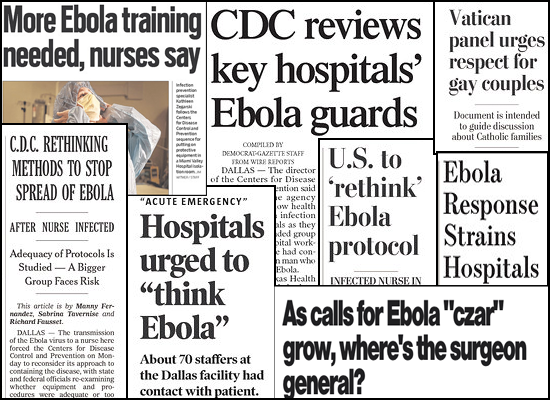
The New York Times is out with an editorial calling for greater assistance to countries battling massive Ebola outbreaks:
[T]he risk that the Ebola virus might cause outbreaks in this country remains small. By far the greater danger lies in the very real possibility that the virus will continue to spiral out of control in Guinea, Liberia and Sierra Leone and spread from there to other parts of Africa or other continents, opening a wider range of pathways for infected people to reach the United States.
Many countries and international organizations, led by the United States, have pledged money, equipment and manpower to fight the epidemic in West Africa. But the aid has been slow to reach the front lines, leaving health care workers with too few treatment beds to accommodate the sick. […] The Army has started deploying thousands of troops to the area to help build new treatment centers, perform laboratory tests and train health care workers in how to treat patients, but most of that help has yet to arrive. It was thus disheartening to hear Maj. Gen. Darryl Williams, the commander of the United States Army Africa, dismiss criticism that American aid had been “too little, too late” with the excuse that the Pentagon was simply filling a “small gap” left by other health organizations.
The United States’ obligation is greater than that; President Obama needs personally to ramp up the urgency of the American response and the level and speed of the resources provided.
Nicole Gaouette at Bloomberg:
“We live in an extraordinarily interconnected world, and that is why it is so essential that we put full energy into stopping this virus in West Africa,” said Nancy Lindborg, an assistant administrator at the U.S. Agency for International Development who’s leading the aid agency’s Ebola response. “It is essential for the entire world to step forward with the kind of help that can stop this epidemic from spreading further.”
[…] In a 2013 analysis of future threats, U.S. intelligence agencies concluded that a pandemic that incapacitated 1 percent of the world’s population — about 70 million people today — would be “one of the most disruptive events possible.”
“I have never seen a health event threaten the very survival of societies and governments in already very poor countries,” Margaret Chan, director general of the Geneva-based World Health Organization, said in a statement yesterday that called Ebola’s spread “a crisis for international peace and security.”
Meanwhile, Celine Grounder at Reuters runs through the facts about Ebola to explain why a likelihood of an outbreak in the United States is so slim:
Once again, the specter of airborne Ebola is being raised.
No virus that causes disease in humans has ever been known to mutate to change its mode of transmission. This means it is highly unlikely that Ebola has mutated to become airborne. It is, however, droplet-borne — and the distinction between the two is crucial. […] As we rule out Ebola being airborne, the droplet-borne risk of Ebola must be addressed. Most important, those on the frontlines—especially nurses and doctors—should be provided with the necessary training and personal protective equipment to ensure that there are no more transmissions within hospitals.
Much more on this and the day’s other top stories below the fold.